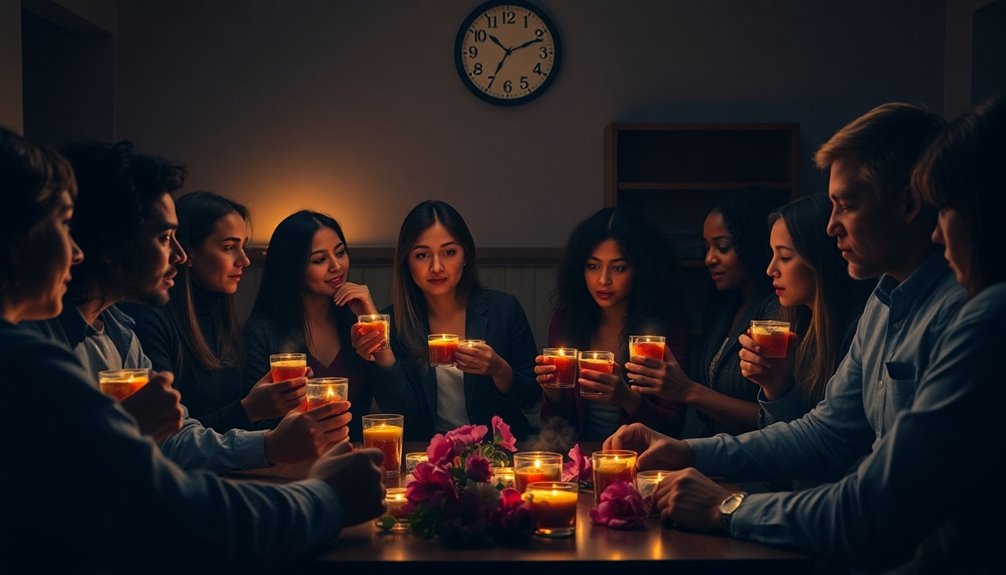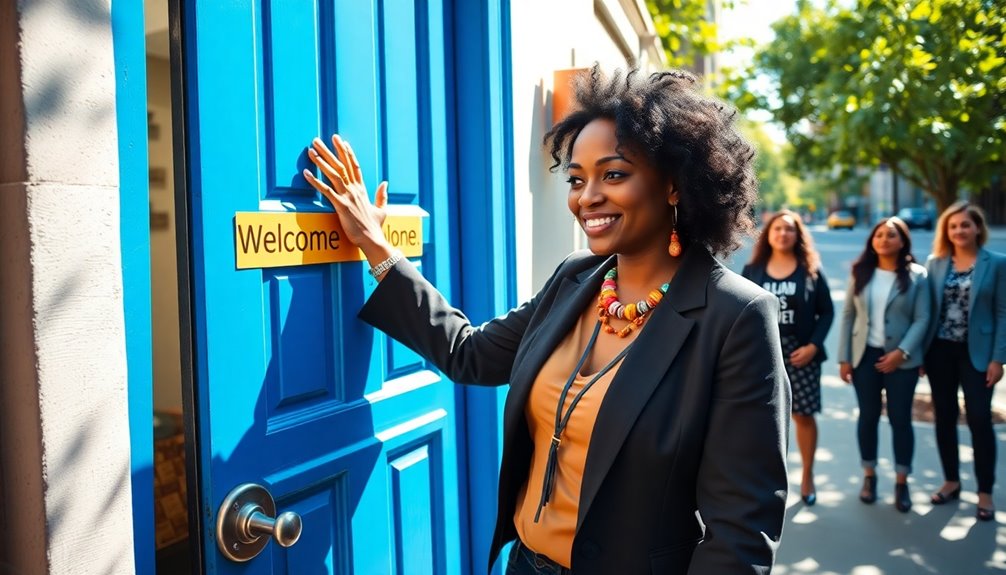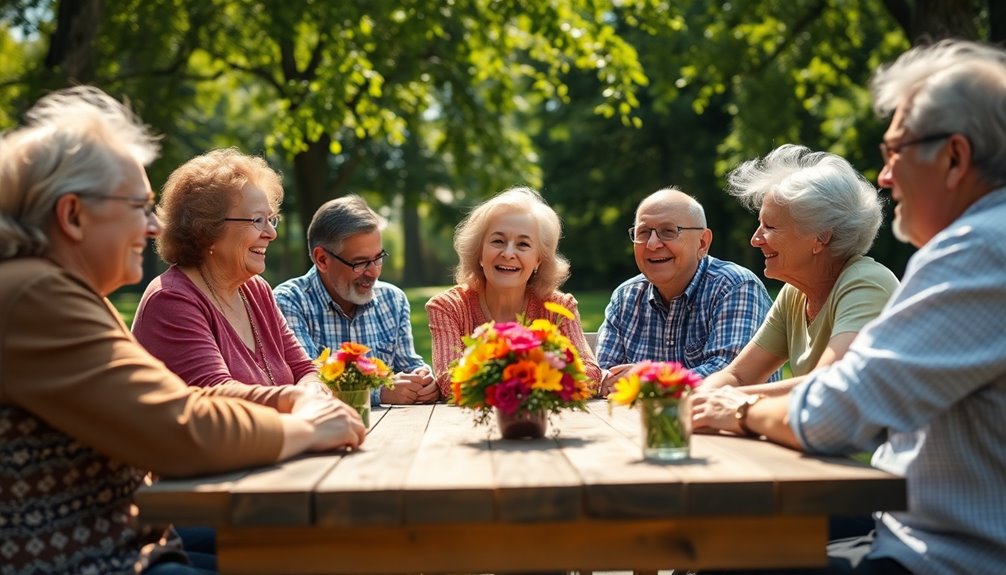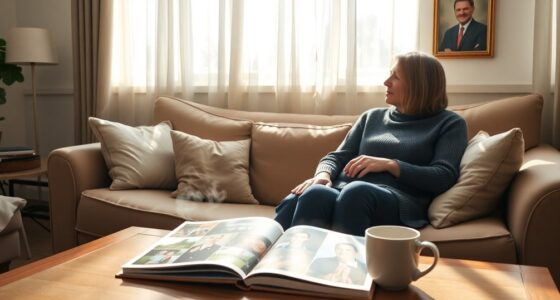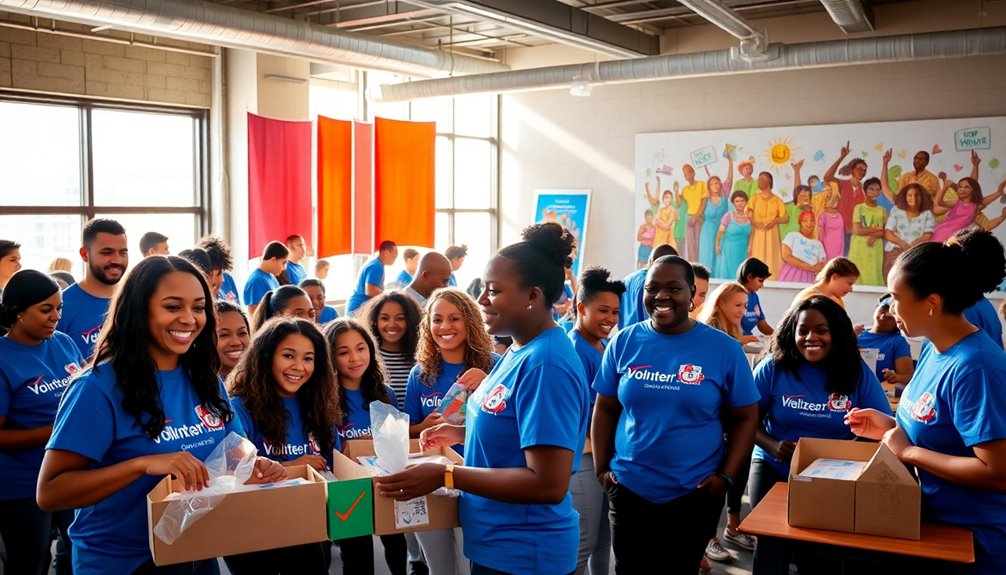A Death Café offers you a chance to openly discuss mortality in a relaxed, supportive environment. By sharing experiences and thoughts about death, you confront the fears and anxieties that often accompany it. These gatherings aren't about grief support but rather about empowering you to explore important life questions. You'll connect with others and understand diverse perspectives on dying and legacy. Through casual discussions, you can demystify death and enhance your emotional intelligence. If you're curious about the wide-reaching impact and unique features of these gatherings, there's so much more to discover.
Key Takeaways
- Death Cafes promote open conversations about mortality, helping participants confront societal death taboos and reduce associated anxieties.
- Discussions at Death Cafes foster community connections and create a supportive atmosphere for exploring end-of-life topics.
- Participants share personal stories and reflections, enhancing understanding of life, death, and the emotional aspects of dying.
- Engaging in these conversations improves communication skills related to death and dying, empowering individuals to discuss their preferences and experiences.
- The relaxed environment encourages participants to reflect on life's important questions, ultimately leading to a deeper appreciation of their mortality.
Concept and Purpose

Death Cafes create a unique space for people to engage in open conversations about death and dying. These informal gatherings encourage you to share thoughts, experiences, and fears in a comfortable environment that's free from any specific religion or belief system. The primary purpose of Death Cafes is to increase awareness of death, helping you make the most of your life while demystifying the topic and reducing the anxiety surrounding it. Understanding the emotional rollercoaster of discussing mortality can enhance the experience.
You'll find that these events aren't grief support or counseling sessions. Instead, they foster inclusive discussions that break down societal taboos, allowing for open and respectful conversations about death. The atmosphere is relaxed, with no set agenda, themes, or guest speakers, ensuring that every voice can be heard.
Held in accessible and confidential spaces, Death Cafes often provide invigorating drinks and cake to enhance the experience. As you participate, you may find that these conversations lead to greater understanding and acceptance of death, making it a more commonplace topic in your life. Ultimately, you'll feel a sense of community and connection with others, creating a supportive environment for discussing this essential aspect of existence. With over 19,594 Death Cafes held since September 2011, the growing interest in these gatherings reflects a widespread desire to engage with the topic of mortality.
Origins and History

In recent years, the concept of Death Cafes has gained traction, tracing its roots back to 2011 when Jon Underwood launched the first gathering in East London. Inspired by Swiss sociologist Bernard Crettaz's 'Cafe Mortels,' Underwood aimed to break the societal taboo surrounding death. He discovered Crettaz's work through an article in the Independent newspaper in November 2010, which sparked his initiative.
The first Death Cafe took place in Underwood's home in Hackney, facilitated by Sue Barsky Reid. Together, they developed a model that encourages open dialogue about death. In February 2012, they published a guide to help others host similar events. The movement quickly spread beyond the UK, with Lizzy Miles in Columbus, Ohio, being the first to adopt the model internationally. This initiative has helped to demystify death and normalize conversations surrounding it, as open communication is vital for addressing underlying issues related to mortality.
Since then, Death Cafes have flourished, held in 92 countries and totaling over 19,151 gatherings to date. The pandemic even led to online events, expanding accessibility. After Underwood's passing in June 2017, the organization continued under volunteers like Reid, Miles, and others, fostering a strong global community committed to discussing death openly.
How Death Cafes Work

Gatherings at Death Cafes create a welcoming space for open conversations about mortality. These non-profit events typically last two hours and involve 6 to 12 participants. You might find yourself in homes, cafes, or even unique venues like cemeteries. The atmosphere is relaxed, often complemented by tea and cake, which helps nurture supportive discussions. In fact, the Death Cafe movement has expanded globally, reaching various cities around the world.
Here's a quick overview of how Death Cafes operate:
| Aspect | Details | Role of Facilitators |
|---|---|---|
| Setting | Homes, restaurants, or unconventional places | Introduce the concept and set rules |
| Discussion Format | Group-directed, no specific topics | guarantee comfort and flow of conversation |
| Participants | Adults, sometimes children with consent | Maintain respect and confidentiality |
Facilitators encourage participants to introduce themselves and share their motivations for attending. They float between groups in larger settings, guaranteeing everyone feels included and respected. Organizers handle logistics like venue and refreshments, while feedback is collected afterward to improve future gatherings. This structure guarantees a meaningful and respectful environment for discussing a topic often considered taboo. Additionally, creating a supportive atmosphere can help participants discuss their retirement savings plans and how they wish to be remembered financially. Facilitators also encourage sensitivity to varying viewpoints, making room for diverse experiences and backgrounds. For instance, to enhance the discussion on retirement savings, they may incorporate insights from thought leaders, including Tovah Feldshuh’s unique perspective on time, which emphasizes the importance of planning for the future while living in the present. This holistic approach not only enriches the conversation but also empowers participants to take actionable steps towards their financial goals, fostering a deeper understanding of their personal narratives and legacies.
Benefits of Participating

Participating in a Death Café can markedly reduce your fear and anxiety about mortality. Engaging in open discussions allows you to confront your feelings about death, making the topic feel less intimidating. By sharing experiences in a safe environment, you can demystify death and gain a more positive insight into the end-of-life process. In fact, the rapid global growth of Death Cafés indicates a widespread interest in normalizing conversations about death. Additionally, the rise of social justice movements has encouraged open dialogue on sensitive topics, including death and dying.
You'll also improve your communication skills. Discussing dying openly with others helps you talk about funeral plans and end-of-life wishes with family and friends. As you practice sharing and listening, you'll become more comfortable discussing death in both private and public settings.
Moreover, Death Cafés foster a sense of connection and community. You'll find that sharing thoughts about death bridges differences and deepens understanding among participants. These gatherings are filled with life, laughter, and profound conversations, offering a supportive atmosphere where you can feel a sense of belonging.
Common Topics of Discussion

Engaging in open conversations about death naturally leads to exploring common topics that arise during Death Café meetings. You'll find that participants often share their personal preferences and wishes, reflecting on what a "peaceful" death means to them. Many discuss their bucket list items, favorite funeral songs, and where they'd like to be at the end of their lives. Understanding the emotional aspects of dying can provide valuable context for these discussions.
| Personal Preferences | End-of-Life Planning | Philosophical Aspects |
|---|---|---|
| Describe a "peaceful" death | Plans for cremation or burial | What is "dying"? |
| Number one bucket list item | Memorial service preferences | What does leaving a legacy mean? |
| Desired location at death | Final requests | Do you believe in something after? |
| Funeral song choice | Ashes plans | What do you want to be remembered for? |
Additionally, discussions often touch on the emotional aspects of dying, such as how you'd like to be remembered or how to support friends facing death. These conversations create a space for reflection, allowing you to confront important life questions while sharing experiences with others. The mission of Death Cafe to provide a relaxed environment for discussing death empowers individuals to explore these topics openly.
Global Impact and Reach

Although Death Café originated in the UK, its influence has spread globally, reaching a diverse range of cultures and communities. Inspired by Swiss sociologist Bernard Crettaz's Café Mortel project, Death Cafés have expanded to North America, Europe, Asia, South America, and Africa. By 2018, events were listed in 56 countries; now, that number has grown to 75. While these cafés are well-established in English-speaking Western countries like the UK, USA, Canada, and Australia, they remain less prevalent in Asia, Africa, Eastern Europe, and Latin America.
Death Cafés confront the 'death taboo' prevalent in many cultures, normalizing discussions about death and dying. This helps reduce fear and fosters intimacy among participants. The cafés reflect a broader cultural avoidance of death, encouraging community responses to demographic changes in dying and death. Organized by local volunteers, these non-profit discussion groups offer free-flowing conversations over tea and cake, without predetermined outcomes. Their adaptable format allows for local translation while maintaining international alignment, making them relevant to social policy and community support. Ultimately, Death Cafés contribute to changing public attitudes and creating compassionate communities around the topic of death, with the initiative having expanded to 75 countries globally since its inception. Additionally, these cafés can serve as a space for individuals to explore their feelings and thoughts about loss, echoing the importance of emotional expression in coping with grief.
Personal Experiences Shared

How do personal experiences shape the conversations at Death Cafés? When you step into a Death Café, your story becomes a crucial thread in the fabric of discussion. Many attendees are driven by curiosity about death or recent losses, seeking a space where they can share without judgment. You'll find that sharing personal stories—whether they're about near-death experiences or moments of profound loss—fosters deeper connections among participants.
The environment is relaxed, allowing you to express yourself freely, often leading to emotional catharsis. You might notice that silence can also play a role; it gives you the space to reflect and gather your thoughts before contributing. Each shared experience can validate feelings of grief and help process pain, reminding you that you're not alone in your journey. In fact, the organic conversation format of Death Cafés encourages a free flow of ideas and emotions, enriching the discussions even further. It's a reminder that the power of imagination can transform our understanding of mortality and foster deeper connections.
Facilitators encourage open-ended questions, prompting you to explore personal beliefs about death. The intimate nature of smaller group discussions often enhances this experience, allowing for more meaningful interactions. Ultimately, your willingness to share shapes the conversations, creating a supportive atmosphere that honors both life and loss.
Community and Supportive Environment

Sharing personal experiences at Death Cafés naturally cultivates a community where support thrives. These gatherings welcome individuals from all walks of life—whether you've experienced loss, care for someone nearing the end, or are a healthcare professional. The inclusive environment encourages open conversations about death in a non-judgmental space. In addition, the sessions aim to increase awareness of death, which ultimately enhances participants' appreciation for life. Engaging in these discussions can also help develop emotional intelligence, allowing individuals to better understand their own feelings about mortality.
| Aspect | Description | Impact |
|---|---|---|
| Inclusive Environment | Open to all backgrounds, religions, and beliefs. | Fosters diversity and understanding. |
| Safe Space | Participant-led discussions with trained facilitators. | Guarantees comfort and respect. |
| Community Building | Relaxed atmosphere with tea and cake encourages connection. | Forms friendships and support networks. |
| Therapeutic Benefits | Helps individuals process grief and anxiety. | Aids in healing and coping with loss. |
In this supportive space, you can share your fears and thoughts without discomfort. Ground rules guarantee that everyone feels safe to engage at their own level. As you connect with others, you'll likely find a deeper appreciation for life and a healthier relationship with mortality—ultimately enriching your experience.
Changing Perspectives on Death

Death Café's mission to demystify death challenges long-held societal taboos and encourages individuals to engage in open conversations about this inevitable part of life. By fostering dialogue, these gatherings help reduce the fear and anxiety often associated with death. Instead of providing therapy or answers, they create a space where you can discuss your thoughts and feelings comfortably.
As you participate, you'll notice a shift in societal views. Death Café promotes respectful discussions, making death a more acceptable topic in everyday life. This movement has spread to over 66 countries, revealing a global desire to change how we perceive death. By talking openly, you gain a deeper understanding of death's role, which can lead to more thoughtful conversations about end-of-life care and planning. Additionally, the movement's rapid expansion with over 9,000 events reflects a growing recognition of the importance of discussing mortality. Engaging in these conversations can also encourage individuals to practice emotional alignment, which is essential for processing grief and loss.
Moreover, these discussions increase awareness of death, prompting you to reflect on your priorities and appreciation for life. Sharing your thoughts can help clarify your wishes and fears, creating a safe environment where everyone feels heard. Ultimately, this open dialogue not only influences broader societal attitudes but also enhances the quality of end-of-life care for individuals and families alike.
Frequently Asked Questions
Are Death Cafes Suitable for Children or Young Adults?
They say, "Curiosity killed the cat, but satisfaction brought it back." When it comes to Death Cafes, they're generally not designed for children or young adults. The discussions can be complex and emotionally heavy, which might be overwhelming for younger participants. However, young adults with emotional maturity may find them beneficial for processing grief. It's crucial to evaluate each individual's readiness before attending, as the environment is focused on adult-oriented conversations.
How Can I Find a Death Cafe Near Me?
To find a Death Cafe near you, start by checking the official Death Cafe website for a directory of events. Use the search function to filter by your location. You can also explore local community centers, libraries, and cafes for listings. Don't forget to look at social media groups or event calendars. If you're still unsure, reach out to local hospice organizations for more information on upcoming gatherings.
Do I Need to Register in Advance to Attend?
Whether you need to register in advance depends on the event. Some gatherings require registration to secure your spot, especially if there's limited capacity or specific guidelines. Others might welcome drop-in attendees, allowing you to join without prior sign-up. If you're attending an online event, you'll likely need to register to receive the login details. Always check the event details to know what's required before heading out or logging in.
Is There a Cost Associated With Attending a Death Cafe?
Attending a Death Café is like stepping into a welcoming circle—there's no cost to join. You won't find ticket prices here; it's completely free. Some venues might suggest donations, but don't worry, they're voluntary and appreciated to help cover expenses. The goal is to create an inclusive space without financial barriers, so you can focus on meaningful conversations without worrying about your wallet. Just come as you are!
Can I Host My Own Death Cafe Event?
Yes, you can host your own Death Café event! Just guarantee it's on a not-for-profit basis, focusing on open discussions without any agenda. You don't need specific qualifications to facilitate; simply introduce the concept and encourage sharing. Choose a comfortable venue, like a café or your home, and provide refreshments to create a welcoming atmosphere. Remember, respect and confidentiality are key to fostering meaningful conversations. Enjoy the experience!
